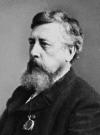- Liebknecht, Wilhelm
-
died Aug. 7, 1900, Berlin, Ger.Imprisoned for participating in the Revolutions of 1848, he lived in exile in England (1849–62), working closely with Karl Marx and Friedrich Engels. Prussia granted him amnesty in 1862, but Otto von Bismarck had him expelled again in 1865. In Leipzig he and August Bebel organized the Social Democratic Labour Party in 1869. He was imprisoned (1872–74) for his writings against the Franco-Prussian War. Bismarck's repression of the socialists brought about a merger with the followers of Ferdinand Lassalle in 1875. With the expiration of the Anti-Socialist Law (1878–90), this party became known as the German Social Democratic Party. Liebknecht continued as a leading spokesman, primarily as a writer for the party's newspaper, Vorwärts.
 Wilhelm Liebknecht, c. 1890Archiv fur Kunst und Geschichte, Berlin
Wilhelm Liebknecht, c. 1890Archiv fur Kunst und Geschichte, Berlin* * *
▪ German socialistborn March 29, 1826, Giessen, Hesse [Germany]died Aug. 7, 1900, BerlinGerman socialist, close associate of Karl Marx, and later cofounder of the German Social Democratic Party.Liebknecht was still a child when his father died, but he was brought up comfortably. He attended the universities of Giessen, Marburg, and Berlin and developed an interest in French socialist thinking. He accepted an invitation to teach at a Swiss elementary school and then decided to study law and be called to the bar in Switzerland (1847).On Feb. 23, 1848, revolution erupted in Paris. He arrived too late to become involved and returned to Germany, where he participated in several revolutionary insurrections that failed. During an attempt to fan the fading revolutionary embers in Baden, he was captured and held prisoner for eight months. In 1849, after his release, he returned to Switzerland.Liebknecht's stay in Switzerland was short, for the Austrian and Prussian governments, fearful of his growing influence among the Swiss workers, succeeded in having him expelled from Geneva. In 1849 he went to England, where he remained for 13 years. In London he joined the Communist League, working closely with Karl Marx and Friedrich Engels and supporting himself as London correspondent for the Augsburger allgemeine Zeitung (“Augsburg Gazette”). In 1862 the Prussian government granted him amnesty; he returned to Berlin and became a writer for the Norddeutsche allgemeine Zeitung (“North German Gazette”), soon becoming an influential socialist. But Otto von Bismarck (Bismarck, Otto von), who had become minister president (prime minister) in 1862, resented Liebknecht's influence among the working classes and, failing to gain his support, had him expelled from Prussia in 1865.In Leipzig, where he moved, Liebknecht joined the floundering Allgemeiner Deutscher Arbeiterverein (General German Worker's Association), founded by the socialist leader Ferdinand Lassalle in 1863. He also formed a friendship with August Bebel (Bebel, August), a woodturner, who on his travels as a journeyman had become familiar with the poverty of the masses throughout Germany. Liebknecht, the writer, and Bebel, the orator and practical politician, complemented one another and together they provided the leadership for German socialism for the remainder of the century. In Leipzig, Liebknecht worked hard to win new recruits for the cause and continued his efforts to educate the masses through the Demokratisches Wochenblatt (“Democratic Weekly”). In 1867 the workers elected Liebknecht to the North German Reichstag, where he opposed Lassalle's advocacy of a “paternalistic” state socialism. In 1869, at a congress at Eisenach, Liebknecht and Bebel organized the Sozialdemokratische Arbeiterpartei (Social Democratic Labour Party) and affiliated it with the First International (International Workingmen's Association), headquartered in London.The outbreak of the Franco-German War in 1870 put Liebknecht's devotion to international socialism to a practical test. His failure to vote for war credits and his writings against the war and the government resulted in his conviction on charges of “treasonable intentions” in 1872. He was sentenced to two years' confinement in the fortress of Hubertusburg, along with Bebel, who was similarly charged.The Prussian military victory in 1871 did nothing to abate the socialists' growing strength in the Reichstag, and Liebknecht continued to be a thorn in Bismarck's side. Bismarck's determination to repress the socialists brought about the merger of the Lassalleans and Liebknechtians as the Sozialistische Arbeiterpartei Deutschlands (Socialist Labour Party) at Gotha in 1875. The Gotha Program, a compromise between the positions of the two parties—although criticized by Marx for its call for government-aided productive organizations—remained the charter of German socialism until the adoption of the Erfurt Program in 1891, which discarded the state-aid provisions of the Gotha Congress and pledged the party to a Marxist program. Bismarck won his battle to repress the socialists in 1878 when the Reichstag adopted the Anti-Socialist Law that, among other things, forbade the publication of socialist literature.Notwithstanding a dozen years of repression, the party continued to grow significantly. When the law expired in 1890, it was obvious that Liebknecht's tactic of education, not conspiracy, had been productive. When the liberated party met at Erfurt in 1891, it adopted a charter embodying the 19th century's fullest expression of social democratic ideas. Thereafter, the party was known as the German Social Democratic Party (Social Democratic Party of Germany). During the final nine years of his life, Liebknecht was one of its leading spokesmen, primarily as a writer for Vorwärts, the party's most prominent newspaper.Additional ReadingRaymond H. Dominick III, Wilhelm Liebknecht and the Founding of the German Social Democratic Party (1982), examines both his personal qualities and his political career.* * *
Universalium. 2010.
